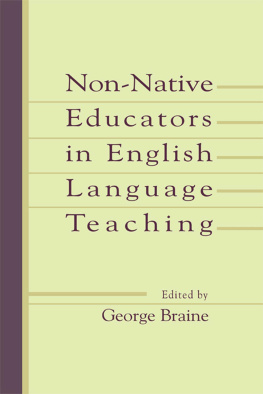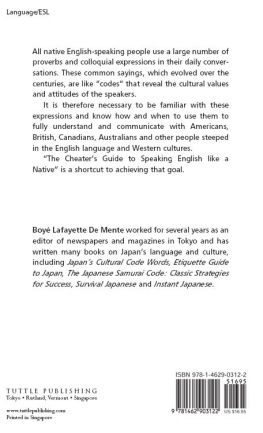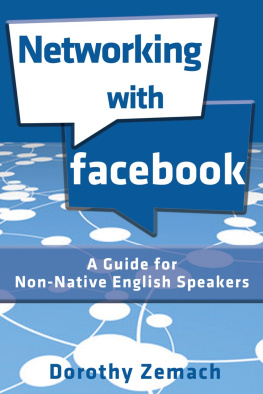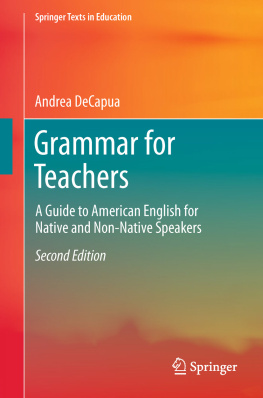Non-Native Educators
in English Language Teaching
Edited by
George Braine
The Chinese University of Hong Kong

First Published by
Lawrence Erlbaum Associates, Inc., Publishers
10 Industrial Avenue
Mahwah, NJ 07430
Transferred to Digital Printing 2009 by Routledge
270 Madison Ave, New York NY 10016
2 Park Square, Milton Park, Abingdon, Oxon, OX14 4RN
Copyright 1999 by Lawrence Erlbaum Associates, Inc.
All rights reserved. No part of this book may be reproduced in any form, by photostat, microfilm, retrieval system, or any other means, without prior written permission of the publisher.
Cover design by Kathryn Houghtaling Lacey
Library of Congress Cataloging-in-Publication Data
Non-native educators in English language teaching/
edited by George Braine.
p. cm.
Includes bibliographical references and index.
ISBN 0-8058-3204-1 (cloth : alk. paper) ISBN
0-8058-3205-X (pbk. : alk. paper).
1. English languagestudy and teachingForeign
speakers. 2. English teachersTraining ofForeign
countries. 3. Language transfer (Language learning)
I. Braine, George.
PE1128.A2N64 1999
428.007dc21 98-50643
CIP
Publisher's Note
The publisher has gone to great lengths to ensure the quality of this reprint but points out that some imperfections in the original may be apparent.
To my co-authors
For their courage and perseverance
Contents
Voices from the Periphery: Non-Native Teachers and Issues of Credibility
Jacinta Thomas |
From the Periphery to the Center: One Teacher's Journey
George Braine |
Learning to Write Academic Prose in a Second Language: A Literacy Autobiography
Ulla Niemel Connor |
Writing From the Vantage Point of an Outsider/Insider
Xiao-ming Li |
Textual Identities: The Importance of Being Non-Native
Claire Kramsch and Wan Shun Eva Lam |
Interrogating the Native Speaker Fallacy: Non-Linguistic Roots, Non-Pedagogical Results
A. Suresh Canagarajah |
Minority Women Teachers of ESL: Negotiating White English
Nuzhat Amin |
English Only or English Plus? The Language(s) of EFL Organizations
Masaki Oda |
To Be a Native or Non-Native Speaker: Perceptions of Non-Native Students in a Graduate TESOL Program
Keiko K. Samimy and Janina Brutt-Griffler |
Preparing Non-Native Professionals in TESOL: Implications for Teacher Education Programs
La D. Kamhi-Stein |
From Their Own Perspectives: The Impact of Non-Native ESL Professionals on Their Students
Jun Liu |
Language Training: A Neglected Area in Teacher Education
Pter Medgyes |
Training Non-Native TESOL Students: Challenges for TESOL Teacher Education in the West
Dilin Liu |
At the 1995 Teachers of English to Speakers of Other language (TESOL) Convention held in Long Beach, I attended a stimulating colloquium titled Research Writing, Genre, and Socialization which examined the role of socialization in non-native speakers (NNSs) understanding and use of various writing genres (Belcher et al., 1995). Listening to the presentations, I wondered how NNS scholar-writers perspectives on similar topics would be received. Would their personal histories and first-hand experiences be of interest to a TESOL audience?
I therefore invited a few colleagues to join me in a colloquium at the 1996 TESOL Convention. So, on a freezing Friday morning in Chicago, Suresh Canagarajah, Ulla Connor, Kamal Sridhar, Jacinta Thomas, Devi Chitrapu, and I presented In Their Own Voices: Non-native Speaker Professionals in TESOL (Braine et al., 1996). The highly charged, mainly personal narratives of the speakers generated much interest. Most encouraging was the enthusiasm of the NNSs in the audience; some claimed that they finally had a voice. The origin of this book can be traced to the interest generated in NNS issues at the Chicago colloquium. In fact, the colloquium has since spawned five other colloquia at subsequent TESOL conventions and inspired the formation of a TESOL Caucus for non-native educators.
The place of native and non-native speakers in the role of English teachers has probably been an issue ever since English was taught internationally. Although English as a Second Language (ESL) and English as a Foreign language (EFL) literature is awash with, in fact dependent on, the scrutiny of non-native learners, interest in non-native academics and teachers is a fairly recent phenomenon. The Belcher et al. (1995) colloquium is one example of this interest. Until recently, the voices of non-native speakers raising their own concerns have been even rarer. Except for a few prominent names such as Braj Kachru and Claire Kramsch, these voices have been submerged in the multitude of presentations and publications.
Non-Native Educators in English Language Teaching is a response to this notable vacuum in the English Language Teaching (ELT) literature, providing a forum for language educators from diverse geographical origins and language backgrounds. All the authors are non-native speakers of English, all except one have received part of their higher education in North America, and all except two chapters are at least partially contextualized in North America. In addition to presentingautobiographical narratives, these authors argue sociopolitical concerns and discuss implications for teacher education, all relating to the theme of non-native educators in ELT.
Some contributors are long-established professionals; others more recent initiates to the field. Their life stories, from origins in distant countries to becoming professionals in North America and Europe, would be unique and intriguing. But, I resisted the temptation to limit the book to personal narratives and invited the authors to explore other issues and concerns that relate to non-native educators. Experienced first hand by the authors, these issues and concerns have implications for a wider audience. Hence, every chapter, whatever the theme, bears the mark of the authors personal experiences as a non-native speaker.
Due to the unique nature of its contributors and contents, the book should make an impact on applied linguistics in general and on ELT in particular. It is meant for non-native speakers who aspire to enter the profession, graduate students in TESOL programs, teacher educators, and all those who are interested in the role of non-native speaker educators in ELT.
In of the book, Who We Are, the first four chapters draw on the authors personal experiences to explore the issues of credibility, journey from the Periphery to the Center, and development as established writers in Englishtwo literacy autobiographies. The fifth chapter takes a non-autobiographical stance, examining the effects of written English on the social and cultural identities of two non-native learners.
, Sociopolitical Concerns, moves the focus from personal to a broader perspective. The sixth chapter examines the native speaker fallacy from its linguistic, pedagogical, and political perspectives. The next chapters explore how non-native speaker status, when added to sexism and racism, discriminates immigrant women teachers in Canada, and the entrenched policies and practices among native speaker educators in one of TESOL's largest international affiliates.















